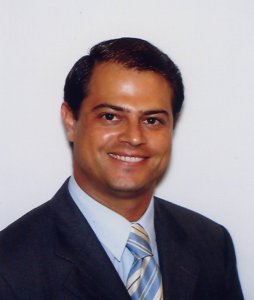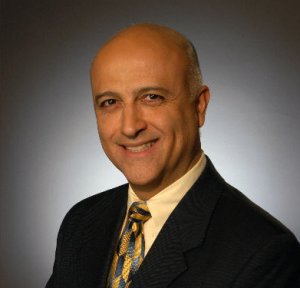Posted by Elena del Valle on July 17, 2006
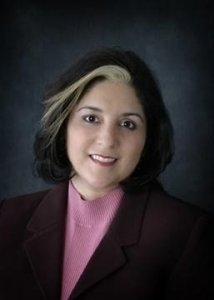
Dora O. Tovar, MPA, president, Tovar Public Relations
Photo: Tovar Public Relations
A podcast interview with Dora O. Tovar, MPA, president, Tovar Public Relations, is available in the Podcast Section of Hispanic Marketing & Public Relations, HispanicMPR.com. During the podcast, she discusses secondary Latino markets with Elena del Valle, host of the HispanicMPR.com podcast.
Dora has more than 17 years experience providing strategic counsel to nonprofit, governmental and corporate clients in the areas of Hispanic marketing, crisis and litigation communications and public affairs. Along with her communications expertise, she provides clients with public policy insight and advocacy efforts to promote relevant cultural competency practices. She received a master’s degree in Public Affairs from the LBJ School of Public Affairs at the University of Texas, Austin and an undergraduate degree in Political Science.
Dora is contributing author of the chapter on public relations, “Hispanic Public Relations and Its Emergence as an Industry,” in the Hispanic Marketing & Public Relations book and the presenter of “The Next Step: Secondary Latino Markets” on HispanicMPR.com.
To listen to the interview, scroll down until you see the “Podcast” on the right hand side, then select “HMPR Dora Tovar, MPA” hit the play button or download it to your iPod or MP3 player to listen on the go, in your car or at home. To download it, click on the arrow of the recording you wish to copy and save to disk. The podcast will remain listed in the July 2006 section of the podcast.
Click the button to hear the podcast:
Click here to sponsor a HispanicMPR.com podcast
Posted by Elena del Valle on July 14, 2006

Jorge Hernandez of Los Tigres del Norte, performing at a concert in Culicán, Sinaloa, Mexico, as seen in “Al Otro Lado”
Photos: Courtesy of “Al Otro Lado”
Director Natalia Almada chronicles the conflicts involving the United States-Mexico border in the documentary “Al Otro Lado” (Spanish for “To The Other Side”), airing on Tuesday, August 1 as part of public television’s (PBS) Point of View (P.O.V.) series. The documentary is seen through the perspective of Magdiel, a 23-year-old fourth–generation fisherman and aspiring composer who gets involved in drug trafficking and illegal border crossing while seeking the “American Dream” and supporting his family through Mexico’s economic crisis.
“We look at issues through Magdiel’s experience on economic decisions because he can’t support his family. In U.S., people look at moral decisions but not on economics in the region of Mexico,” said Almada. “There is injustice with people dying in the border and films look at (an) intimate portrait of someone making decisions for family in (an) intimate way. I don’t think a lot of people recognize this and they look at numbers.”

Man at Los Angeles club, as seen in “Al Otro Lado”
In, “Al Otro Lado,” poor fishing practices and global demands in Magdiel’s hometown, Sinaloa, propel him to become involved as a drug trafficker for his friends and to cross the border illegally to the United States. The documentary uses the Mexican tradition of Corrido music, which is compared to ganster rap in content and lyrics, to aid in telling the film’s conflict with drug trafficking.
“Al Otro Lado” was selected as part of the Tribeca Film Festival’s “All Access Program,” and had a week-long run at the Museum of Modern Art in 2006. It has received the following awards: New York International Latino Film Festival’s Cultural Voice Award in 2005; Puerto Rico International Film Festival’s Best Documentary in 2005; and CineFestival’s Best Feature Film in 2005.
Almada has won awards at the Tribeca and Chicago International Film Festivals. She received a master of fine arts degree from the Rhode Island School of Design. This is her first documentary series.
P.O.V., in its 19th season on PBS, airs Tuesdays at 10 p.m., from June through October. More information about P.O.V is available online at PBS.org — Sergio Carmona
Posted by Elena del Valle on July 13, 2006
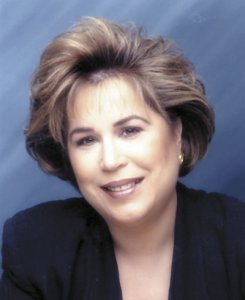
Maria Cisneros, agent, State Farm Insurance
Photos: State Farm Insurance, Siren Studios
The National Hispana Leadership Institute (NHLI) selected Miami and Indianapolis as the final two of seven cities for its empowerment conferences. A half-day professional development and motivational conference will be held July 14, 2006 at the Biltmore Hotel in Coral Gables. Admission for the event, which begins at 8 a.m., is $25.

Amy Serrano, director, writer and producer, Siren Studios
Following a 30 minute discussion about NHLI, there will be a presentation: “The Seven Demands of Leadership,” and a panel discussion, “Latinas Sharing Their Secrets of Success.” Speakers include Zulma Barrios, L.H.D, senior advisor, Gallup University; Anitere Flores, representative, Miami-Dade county; Maria Cisnero, agent, State Farm Insurance; Raquel Egusquiza, director community development & international strategy, Ford Motor Company; Ana Acle-Menendez, editor, The Miami Herald; Amy Serrano, director, Siren Studios; and Marisa Rivera-Albert, president, NHLI.
The Virginia based organization provides leadership training opportunities for Latinas as “ethical world leaders.” The next NHLI event will be in Indianapolis, Indiana at the Westin Indianapolis Hotel on August 18, 2006. More information is available online at NHLI.org — Melissa Gonzalez.
Posted by Elena del Valle on July 12, 2006
By Steve Cody, chairman of the PRSA Counselors Academy and managing partner, Peppercom and Stephanie Chaney, junior account executive, Peppercom
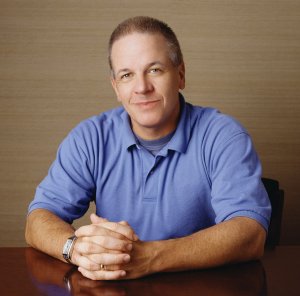

Steve Cody and Stephanie Chaney from Peppercom
Photo: Peppercom
Demographers predict by the year 2050 Hispanics will account for 24 percent of the population. They’re already a majority in California, where they represent 32 percent of the state’s residents. And Hispanics are not only growing in numbers, but in political and financial power as well.
So what does this mean to the PR industry?
The public relations industry is experiencing a growing demand from clients who want to reach the Hispanic markets. The number of bilingual public relations campaigns is steadily increasing. To be successful – and not embarrassed – PR firms need to be sensitive about how they develop and implement their Hispanic campaigns.
Click here to read the complete article
Posted by Elena del Valle on July 11, 2006
Sergio Sanchez, director of Hispanic brand initiatives, Sallie Mae
Photos: Sallie Mae, USA Funds
Reston, Virginia — Sallie Mae® and USA Funds® recently unveiled 2Futuro, a new college-financing and outreach program for Hispanic students and their parents which will be available in the fall. According to Sallie Mae and USA Funds representatives, 2Futuro is the only fully bilingual college-financing and outreach program that enables Hispanic parents and students to apply for college loans in Spanish. The program, currently available in four states, offers dedicated Spanish-language customer service support to students, parents, and financial-aid administrators. It also offers access to scholarships, grants and financial-aid information through the Spanish-first fully bilingual 2Futuro website.
“2Futuro was created to help Hispanic students achieve their dreams of postsecondary education,” said Sergio Sanchez, director of Hispanic brand initiatives, Sallie Mae. “More importantly, 2Futuro helps to integrate parents of Hispanic students into the process and helps them make the best possible college-financing decisions.”
According to the non-profit Hispanic Scholarship Fund, Hispanics are the nation’s largest ethnic-minority group and the fastest-growing segment of our population, yet they have some of the lowest college graduation rates of any group (estimated at 10 percent). Figures from the National Center for Education Statistics indicate that in 2000 Hispanics accounted for 7 percent of students enrolled at four-year institutions.
Henry Fernandez, executive director
Scholarships, Outreach and philanthropy, USA Funds
“Providing better information to this community about the value of a college education and the steps families need to take to prepare for college is a key to increasing the college-going and graduation rates of Hispanics,” said Henry Fernandez, executive director of scholarships, outreach and philanthropy, USA Funds.
Proponents expect to facilitate the loan process work of higher educational institutions. By offering online loan applications in Spanish and English, 2Futuro may be a tool for schools to communicate with their bilingual borrowers. This in turn could assist schools to improve enrollment rates by raising their visibility in the Hispanic community. 2Futuro will provide access to loan benefits through Sallie Mae’s family of lenders. All 2Futuro loans will be guaranteed by USA Funds.
Sallie Mae’s philanthropic arm, The Sallie Mae Fund, recently concluded its second nationwide Paying for College Bus Tour. This year’s bus tour granted $164,000 in scholarships. Organizers estimate that the program provided college outreach and counseling services to 45,000 Hispanic students at 77 locations.
Sallie Mae is a leading provider of education funding, and USA Funds is a leading education-loan guarantor. Additional information about 2Futuro is available online at 2futuro.com
Posted by Elena del Valle on July 10, 2006
Click here to sponsor a HispanicMPR.com podcast
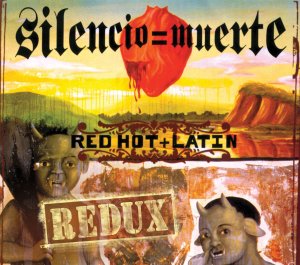
Red Hot & Latin Redux album cover
Photo: Nacional Records
In celebration of the ten year anniversary of “Red Hot & Latin,” Nacional Records is bringing back the compilation and reissuing it as “Red Hot & Latin Redux” with five new bonus tracks from Latin alternative artists like Brazilian Girls with Kevin Johansen, Thievery Corporation, Nortec Collective, Kinky and Plastilina Mosh.
The album also features remastered tracks from the original release such as bilingual collaborations between David Byrne and Café Tacuba, Fishbone and Los Fabulosos Cadillacs, Los Lobos and Money Mark and Laurie Anderson and Aterciopelados.
Silencio=Muerte: Red Hot & Latin, originally released in 1997 on Jellybean Benitez’ H.O.L.A Recordings, was the tenth album in the Red Hot series created to fund the fight against AIDS in Latin America and the Latino community. Some thought the pairing of artists like David Byrne and Café Tacuba reflected a cultural encounter ahead of its time.
When “Red Hot & Latin” was originally released, the album was the subject of an MTV special. Profits generated by Red Hot & Latin Redux will go to the Red Hot Organization to fight AIDS in the U.S. Latino community and in Latin America. For more information online visit RedHot.org
To listen to “What’s New Pussycat,” a song by Los Fabulosos Cadillacs and Fishbone from the recently released “Red Hot & Latin Redux” album, scroll down on HispanicMPR.com until you see “Podcast” on the right hand side, then select “What’s New Pussycat” by clicking on the title or on the play button. You can also download it to your iPod or MP3 player to listen on the go, in your car or at home. To download it, click on the arrow of the recording you wish to copy and save to disk. The podcast will remain listed in the July 2006 section of the podcast.
Click the button to hear the podcast:
Click here to sponsor a HispanicMPR.com podcast
Posted by Elena del Valle on July 7, 2006

Ricardo Montalban’s American high school diction teacher inspired his future as one of Hollywood’s most recognizable Mexican Americans, seen here as Fantasy Island’s “Mr. Roarke”
Photo: Photofest and Shades of L.A./Los Angeles Public Library
WLIW will redistribute “The Mexican Americans,” originally produced in 2000, nationwide on public television in August 2006. According to promotional materials actor Ricardo Montalban, comedian Paul Rodriguez, singers Vikki Carr and Tish Hinojosa, former U.S. Secretary of Energy Bill Richardson, director Luis Valdez (“La Bamba”), activist Dolores Huerta, artists, politicians, journalists, and community leaders share their personal stories during the program.
According to the film producers, Mexican Americans defended this nation in every war in the 20th century, becoming among the highest decorated ethnic groups. “The Mexican Americans” looks at the Mexican diaspora and its various waves such as the “accidental immigrants” who found themselves on the other side of the California and New Mexico borders at the end of the U.S.-Mexican war; the miners and railroad workers who came after the Mexican Revolution; and the migrant farmers who came to the United States when their Mexican ranchos were taken from them. “The Mexican Americans” endeavors to showcase the challenges they overcame, and the changes that their children have affected in the United States.
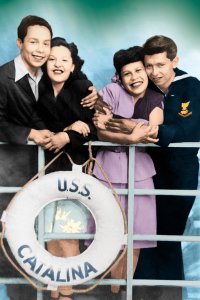
World War II servicemen and their girlfriends
For the migrant farmer, traveling up and down the United States following crop seasons or a wage increase of as little as two cents a bushel, playwright and director Luis Valdez recalls in the program, home “was a question mark.” But as many in the program recognize, this sacrifice reaped the American Dream, and when the children of these laborers succeeded, they never forgot where they came from.
Comedian Paul Rodriguez shares an emotional account of the day he handed his father the deed for the 40 acres of farmland his parents worked to provide for the family when he was a small boy. He was able to make the purchase from a level of success they never imagined possible for themselves.
The program also focuses on Mexican-Americans’ ability to improve the quality of their experience in the United States within a generation; and the late Cesar Chavez and Dolores Huerta’s efforts. The program includes archival film and photos blended with modern footage of communities in California, Texas, and New York in order to portray the Mexican American community’s heritage.
“The Mexican Americans” is the twelfth program in WLIW New York’s series of cultural documentaries celebrating the diversity of America, which also includes “The Cuban Americans” and “The Puerto Ricans: Our American Story.” It was produced by Roy Hammond, executive producer; Roman Brygider, producer and director; and producers Robin Llompart and Blanca Santos.
Posted by Elena del Valle on July 6, 2006
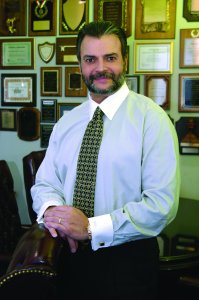
George L. San Jose, president and COO, San Jose Group
Photo: The San Jose Group
Chicago, Illinois – The San Jose Group’s “El cerdo es bueno” campaign earned a 2006 Bronze EFFIE® Award as the “best Hispanic marketing program of the year.” According to The San Jose Group representatives, the campaign increased pork consumption among Hispanics despite their initial misconceptions about pork’s health benefits and quality.
“Our office literally erupted in cheer when we were notified that we won an EFFIE,” said George L. San Jose, president and COO, The San Jose Group. “We pride ourselves on delivering results for our clients. To have our campaign judged as the year’s best in our industry is a career highlight for our team.”
“We are absolutely thrilled. It shows that we are not only capable of changing this by a margin, but we radically changed consumer behavior,” said Jennifer Woods, executive vice president, The San Jose Group. “We changed perspective and behavior which ultimately increases sales.”
The company launched the campaign, which translates into “Pork is good,” in 2002 on behalf of the National Pork Board to promote “the other white meat” to Hispanics. Initial research revealed that Hispanics had misconceptions about pork. Many thought pork was unhealthy because of its fat and cholesterol content and that it posed health risks like trichinosis, a parasitic disease caused by eating raw or undercooked pork.
Utilizing television, outdoor, radio and print advertising, website development, retail promotions and public relations, The San Jose Group embarked on an integrated marketing campaign to convince Hispanics that pork is healthy and safe to eat. The public relations component included an intense media relations effort that enlisted sources to provide culturally relevant information about pork’s nutritional value as well as pork production and quality control practices in the United States.
The San Jose Group believes that the campaign resulted in a 75 percent increase in pork purchase among Hispanics. Company representatives estimate that the editorial coverage they secured approximated 31 million gross impressions, and the equivalent of $1.7 million in media value.
The EFFIE® Award, sponsored by the New York American Marketing Association, is said to honor results. The San Jose Group, one of the oldest independent Hispanic marketing agencies in the U.S., was the only Hispanic agency to receive an EFFIE® this year. The San Jose Group is a consortium of marketing communications companies specializing in reaching the Spanish-speaking Americas. — Sergio Carmona
Posted by Elena del Valle on July 5, 2006
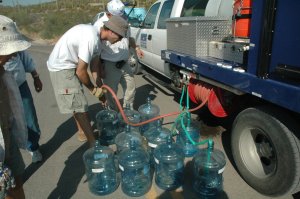
Humane Borders volunteers fill water bottles
Photos: Kent Brodie
Los Angeles, California – Victor Favela, president of Delgada y 30, plans to place $60 bottles of his weight loss product throughout the Arizona desert. Why, you may wonder. According to Favela, due to drastic measures in areas of California and Texas by the Department of Homeland Security Border Patrol and civilian militias, more than 40 percent of undocumented immigrants crossing the border in the last weeks have been forced to cross through the Sonora dessert in Arizona.
The former surgical technologist is not alone in his resistance to U.S. border policy. Concerned members of local nonprofit organizations have been helping for years. Paisanos al Rescate has been using low-flying planes to drop water bottles in the desert; and Humane Borders, a nonprofit organization based in Tucson, Arizona, maintains water stations in the desert.
Faith motivated Humane Borders offers humanitarian assistance through more than 83 emergency water stations on and near the U.S.-Mexican border. Paisanos al Rescate, a volunteer driven nonprofit, drops water and information with parachutes along the Texas, New Mexico, Arizona and California borders with Mexico. The chutes include methods for recipients to signal the aircraft in a life threatening situation. In those cases, Paisanos al Rescate will assist in coordinating rescue efforts with the U.S. Border Patrol Search and Rescue (BORSTAR).
“More than 2,000 undocumented immigrants have died in the desert since 1998,” said Favela. “It’s sickening to see so many people die unnecessarily. There is an all natural ingredient called pepino espinoso in every capsule of my product. It’s made from a cactus like plant discovered over 2,300 years ago by an ancient tribe of the Kalahari desert in South Africa. They’ve been using it for centuries to curb appetite and thirst while they trek across the desert.”
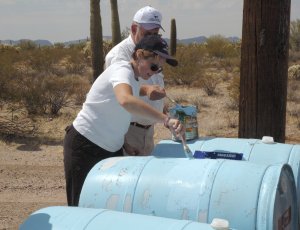
Painting water tanks
Water distribution has saved many lives. But according to volunteers, dropping drugs or other substances in the dessert could be dangerous to people and animals. Not everyone agrees that distributing weight loss products in the dessert is a good idea.
“We’ve given away over 75,000 gallons (of water) in five years and we know that people are alive today because they had water from our water stations. I would be against any kind of drug or substance that alters their perception of what their body needs,” said Sue Goodman, executive director of Humane Borders. “It’s very scary.”
The Humane Borders, a 501(c) (3) organization established in 2000 by Rev. Robin Hoover, water stations vary. Some consist of one 65-gallon barrel of water and others may have a dozen barrels, emergency rations, first aid kits and, in winter, warm clothes. Through collaboration with authorities, such as the U.S. Border Patrol and Consulate of Mexico, Humane Border representatives have a detailed map they use to determine the location of the stations on public and private lands.
Hundreds of volunteers, including 60 trained drivers, head out to the desert for 70 trips each week. They maintain the stations, refilling the water barrels, picking up discarded items and reporting vandalism. More information is available online at HumaneBorders.org and PaisanosAlRescate.org
Posted by Elena del Valle on July 3, 2006
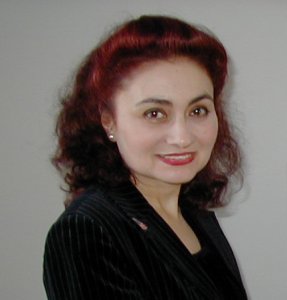
Nara Venditti, Ph.D., CEO, Succeed in America
Photo: Succeed in America
A podcast interview with Nara Venditti, Ph.D., CEO, Succeed in America, is available in the Podcast Section of Hispanic Marketing & Public Relations, HispanicMPR.com. During the podcast, she discusses Marketing to Hispanics through Educational Resources with Elena del Valle, host of the HispanicMPR.com podcast.
During her career she has worked as an educator and in-house international assignment consultant. The author of 65 published works, she is a third-generation educator and the recipient of a State of Connecticut citation for her dedication to making a difference in the community. Her recent books are How to Get a Job in the USA and Ameri$peak.
Throughout her 25-year career, she has worked with adult students in the academic and business environments. She is an adjunct lecturer at Western Connecticut State University and the Yale University Summer Business School. She writes a column in Tribuna, S-Business magazine, the magazine of the Association for Service Management International, and Mobility, a magazine for domestic and international relocation. She hosts “Community Forum,” a Connecticut public television program. In 2005, she was honored by the Connecticut Refugee and Immigrant Coalition.
To listen to the interview, scroll down until you see the “Podcast” on the right hand side, then select “HMPR Nara Venditti” hit the play button or download it to your iPod or MP3 player to listen on the go, in your car or at home. To download it, click on the arrow of the recording you wish to copy and save to disk. The podcast will remain listed in the July 2006 section of the podcast.
Click the button to hear the podcast:
Click here to sponsor a HispanicMPR.com podcast







